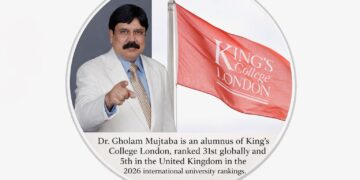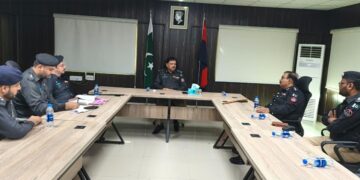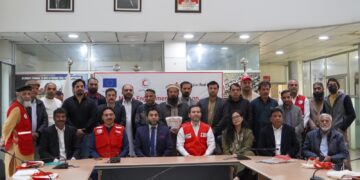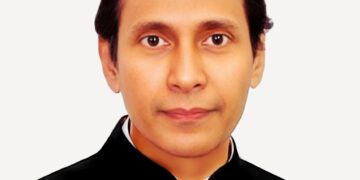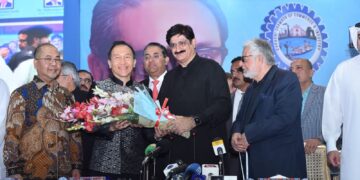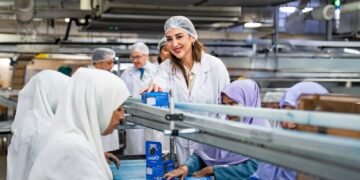Hakim Mohammad Said became a legend in his own lifetime. With his incredible vision, commitment, discipline, and talents he turned his enterprise Hamdard, initially an Unani pharmaceutical company, into a massive organization that distinguished itself in the field of social service after being transformed into a Waqf/trust dedicated to the nation’s health and education.
The choice of the word ‘Hamdard’ as the title of the company was a clear indication that its founder desired to serve humanity from the outset in the process of carrying out business activities.
‘Hamdard’ is a compound word derived from Persian, which combines the words ‘ham’ used in the sense of ‘companion’ and ‘dard’ which means pain. The meaning of ‘Hamdard’ therefore becomes ‘a companion in pain’ and ‘sympathizer in suffering’ which reflect noble cause.


Historically Hakim Mohammad Said’s father Hakim Hafiz Abdul Majeed had laid the foundation of Hamdard Dawakhana in 1906. It all began with a herb shop in Delhi which went from strength to strength and earned the reputation of being the finest supplier of herbs.
Hakim Mohammad Said migrated to Karachi soon after the creation of Pakistan and brought with him his extraordinary skills and the burning desire to contribute to the nascent state. He started off with a couple of rented rooms. That’s how the House of Hamdard began its journey in Pakistan.
Hakim Said had limited resources at his disposal at the outset. But he made up for his awesome will power which drove him. He had total faith in his abilities. He worked round the clock to accomplish his cherished goals. He succeeded in turning his dreams into reality. Hamdard took off and from a modest shop and clinic of the Eastern system of medicine emerged an institution whose growth became phenomenal.
In a matter of few years, he converted Hamdard into a waqf, Islamic irrevocable trust, in which almost all the profits of Hamdard Pakistan were made over to the trust, for use in the development of health, education, and similar nation-building and philanthropic fields. Later Hamdard Foundation Pakistan was created to manage these funds.
Mrs Sadia Rashid, the daughter of the great Hakim Mohammad Said, is currently the Chief Mutawallia/Chairperson of the Hamdard Laboratories (Waqf) Pakistan besides being the President of the Hamdard Foundation.
She has inherited the leadership qualities from her illustrious father who also mentored her as she had worked closely with him for a number of years. She has derived the inspiration and the iron will from him and remains committed to pursuing his noble causes.
The credit for implementing the visionary and the lofty ideas of Hakim Mohammad Said into reality belongs to Dr. Navaid-ul-Zafar, who himself has set very high standards. A firm believer of professional management, he has led by example having commanded respect from all quarters. He’s known as a man of integrity, wisdom, and foresight, always willing to guide and help others.
As the Managing Director/Senior Mutawallia of the Hamdard Laboratories, he is acclaimed to have looked after the challenging administrative matters with distinction, and his troubleshooting acts are talked about with awe and reverence. Preferring to maintain a low profile, he has played a monumental role in guiding the institution to its present position.
PROMOTION OF EASTERN MEDICINE
Hakim Mohammad Said played a key role in promoting Eastern Medicine, which has specific historical importance, and indeed it is an integral part of our national heritage. Now the system has crossed national boundaries and it is popular among the masses globally.
Most medicines and remedies used in Unani are from common herbs and foods. The base used in Unani medicine is often honey. Honey is considered by some to have healing properties and hence is used in food and medicines practiced in the Islamic world.
The Unani System has shown remarkable results in curing the diseases like arthritis, leucoderma, jaundice, liver disorders, nervous system disorders, bronchial asthma, and several other acute and chronic diseases where other systems have not been able to give the desired response. Hamdard has believed in combining the best of both worlds.
It manufactures traditional herbal medicines and products in the most modern plants, using update machinery and techniques. Over five hundred herbal preparations, syrups, semi-solids, and solids are manufactured on the principles of the Unani system of medicine.
HAMDARD FOUNDATION
Hamdard is not merely a commercial enterprise but it is an institution of social welfare. It has dedicated itself to the national uplift and welfare of the people. Its entire proceeds are meant to be spent in national and international humanitarian pursuits, through Hamdard Foundation Pakistan which was founded in 1964.
Hamdard Foundation Pakistan has a broad-based programme which includes the establishment of educational institutions, professional colleges, hospitals, and free mobile dispensaries providing free or low-cost treatment to the common man; plus research laboratories, institutes and much other social welfare and philanthropic activities.
It was formed in order to administer and control the philanthropy separately and independently from a business unit. It is the first NGO of its kind to have come into being in Pakistan. It has been known to assist authors, writers, intellectuals, scholars, and teachers in their academic pursuits.
MADINAT AL·HIKMAH
Madinat al-Hikmah, a city of education, science, and culture, is recognized as the largest and the most prestigious project having been undertaken by any welfare organization in the country. Its foundation stone was laid in 1983.
It was a dream of Hakim Mohammed Said which did come true in his own lifetime. It’s a monumental project, developed under the personal supervision of the legend who had dedicated his life to the promotion of science, education, and culture.
Madinat al-Hikmah spreads over nearly 500 acres of land at a distance of 27 kilometers from the downtown of Karachi and it has been equipped with all modern facilities. In view of the significance of the project, the government has reserved, for SO years, the adjoining 5,000 acres of its land for this city of education, science, and culture.
BAIT AL·HIKMAT
Bait al Hikmat is the main library of the Hamdard University situated at Madinat al-Hikmah. It was inaugurated in 1989, having been named after the famous library, House of Wisdom, in Baghdad. It symbolizes a wooded transfusion to the Muslim’s traditional love for learning and scholarship.
The library houses over half a million modern volumes as well as thousands of ancient manuscripts, millions of clippings, translations of the Holy Quran in over 60 languages, audio-video cassettes, as well as postage stamps, coins, and photographs. Possessing all requisite modern equipment and facilities, it is used by students, faculties, researchers, scholars, and freelancers nationally and internationally.
The Library reflects the memory of the first Bait al-Hikmah, which was established in Baghdad by Khalifa Abu Jafar al-Mansur and later was developed by Caliph Harun al-Rashid and Caliph Mamoon Rashid during the 14th century.
HAMDARD VILLAGE SCHOOL
Hamdard Village School has been providing opportunities for education to the children of villages adjoining Madinat al-Hikmah. It has been helpful in bringing about a very positive change in the life of the area people. The school is not only free but its enrolled students also receive books, uniforms, and shoes through the courtesy of the Hamdard Foundation. It was the mission of Hakim Mohammed Said that no child of Pakistan should be deprived of education. The new campus of Hamdard Village School was inaugurated in 2003. It is managed professionally and its students are proactively involved in the extracurricular activities as well. It has been doing particularly well on the football field where its students have won quite a few trophies over the years.






